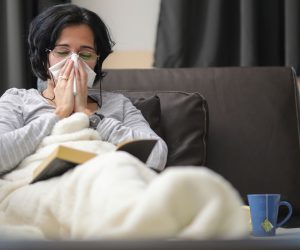Table of Contents
Where to Put a Humidifier When You’re Sick
Experts recommend cool mist humidifiers near your bed (avoiding direct mist) for congestion & dry coughs. Read on for specifics!
According to the Mayo Clinic, a cool mist humidifier works by increasing moisture in the air, which can soothe irritated respiratory passages and make it easier to expel mucus. The moist air also prevents tissues in your nose and throat from drying out, which can worsen coughs and sore throats.
When you’re battling a cold, cough, or congestion, using a humidifier can be a game-changer for your comfort and recovery. Here’s everything you need to know about choosing and using a humidifier to ease your symptoms.
What Type of Humidifier Is Best for Coughing and Congestion?
For coughing and congestion, cool mist humidifiers are generally recommended. They add moisture to the air without heating it, making them safer around children and during sleep. Cool mist options like ultrasonic or evaporative humidifiers are ideal for easing respiratory symptoms.
What to Set Your Humidifier At When Sick
The ideal humidity level in your room should be between 30-50%. Higher levels can promote mold and dust mites, while lower levels might not provide enough relief. Use a hygrometer to monitor and adjust your humidifier accordingly, aiming for the higher end of this range when dealing with congestion.
How Close Should a Humidifier Be to Your Face?
It’s best to place the humidifier about 3-5 feet away from your bed. This distance allows the mist to disperse evenly throughout the room without directly impacting your face, which can cause discomfort or excessive moisture.
Does Sleeping with a Humidifier Help a Cold?
Yes, sleeping with a humidifier can help alleviate cold symptoms. The added moisture in the air can soothe irritated tissues in your throat and nasal passages, making it easier to breathe and promoting better sleep.
Does Sleeping with a Humidifier Help with Congestion?
Absolutely. A humidifier can help loosen mucus, making it easier to clear congestion. The moist air also prevents the drying out of nasal passages, reducing the stuffy feeling that comes with a cold or flu.
Best Humidifier for Coughing at Night
When choosing a humidifier for nighttime cough relief, look for:
- Quiet operation: Ensures your sleep isn’t disturbed.
- Cool mist feature: Safer and more comfortable for continuous use.
- Adjustable settings: Allows you to control the output for optimal comfort.
- Easy maintenance: Reduces the risk of bacteria and mold growth.
Ultrasonic cool mist humidifiers are often favored for their quiet operation and fine mist, making them excellent for use during sleep.
Best Humidifiers for Your Bedroom
Best Overall:
 Honeywell HCM-350 Cool Moisture Humidifier
Honeywell HCM-350 Cool Moisture Humidifier
For overall effectiveness and peace of mind, the Honeywell HCM-350 Cool Moisture Humidifier stands out.
This evaporative humidifier combines whisper-quiet operation with a large tank for extended runtime, ensuring uninterrupted relief throughout the night.
Plus, the built-in UV light provides an extra layer of protection against bacteria and mold, giving you peace of mind as you breathe easy. While its footprint might be slightly larger, its comprehensive features cater to those seeking maximum relief and long-lasting comfort.
Key features:
- Quiet operation: Evaporative design minimizes noise for undisturbed sleep.
- Large 1.1-gallon tank: Provides up to 24 hours of runtime on low setting.
- Three fan settings: Customize mist output for your comfort level.
- Built-in UV light: Kills bacteria and mold for cleaner air.
Considerations: Slightly larger footprint compared to other options.
Check HoneyWell Price Here
Runner Up:
 Levoit 6L Cool Mist Top Fill Essential Oil Diffuser
Levoit 6L Cool Mist Top Fill Essential Oil Diffuser
If you prioritize extended performance and a touch of luxury, the Levoit Humidifiers for Bedroom Large Room Home is a strong contender.
This feature-packed model boasts an impressive 6-liter tank for long-lasting use, coupled with multiple mist settings for precise control over the airflow.
What’s more, the built-in aromatherapy diffuser allows you to add essential oils for an extra touch of relaxation.
While it comes at a slightly higher price tag, the extended runtime and spa-like features might be worth it for those seeking ultimate comfort.
Key features:
- Large 6-liter tank: Offers up to 60 hours of runtime on low setting.
- Four mist settings: Precise control over mist output for optimal comfort.
- Built-in aromatherapy diffuser: Add essential oils for enhanced relaxation.
- Optional night light: Provides a soft glow for a calming ambiance.
Considerations: Slightly pricier than other options.
Check Levoit Price Here
Best Value:
 Pure Enrichment MistAire Ultrasonic Cool Mist Humidifier
Pure Enrichment MistAire Ultrasonic Cool Mist Humidifier
On a budget? The Pure Enrichment MistAire Ultrasonic Cool Mist Humidifier delivers effective relief without breaking the bank. This compact and affordable option offers quiet operation, a decent 1.5-liter tank capacity, and a 360-degree mist nozzle for even distribution. While its tank size is smaller than the others, it remains a great value choice for basic yet effective cough relief.
Key features:
- Affordable price: Budget-friendly option for basic needs.
- Compact design: Takes up minimal space on your nightstand.
- Quiet operation: Doesn’t disrupt your sleep.
- 1.5-liter tank: Provides up to 25 hours of runtime on low setting.
- 360-degree mist nozzle: Ensures even distribution of moisture.
Considerations: Smaller tank capacity compared to other options.
Check Pure Enrichment Price Here

Frequently Asked Questions (FAQ) About Using a Humidifier When Sick
Q1: What are the benefits of using a humidifier when I’m sick?
A1: A humidifier increases the moisture level in the air, which can help soothe irritated tissues in the nose and throat, ease coughing, relieve congestion, and improve overall comfort when you’re sick.
Q2: Cool mist vs. warm mist humidifiers: Which is better for colds and congestion?
A2: Cool mist humidifiers are generally recommended for colds and congestion because they emit moisture at room temperature, making them safer and more comfortable, especially during sleep.
Q3: How does a humidifier help with coughing and sore throat?
A3: By adding moisture to the air, a humidifier can prevent the drying out of respiratory passages, reducing irritation that leads to coughing and sore throats.
Q4: What is the ideal humidity level for a room when using a humidifier while sick?
A4: The ideal indoor humidity level is between 30-50%. This range helps relieve respiratory symptoms without promoting the growth of mold and dust mites.
Q5: Can using a humidifier reduce the spread of airborne viruses?
A5: Proper humidity levels can reduce the survival of certain viruses in the air, potentially lowering the risk of infection, but it should not be solely relied upon for virus control.
Q6: How close should I place the humidifier to my bed?
A6: Place the humidifier about 3-5 feet away from your bed. This ensures even moisture distribution without making the area around your bed too damp.
Q7: Is it safe to use tap water in my humidifier?
A7: Using distilled or demineralized water is recommended to avoid the buildup of minerals and the release of white dust into the air, which can occur with tap water.
Q8: How often should I clean my humidifier, and why is it important?
A8: Clean your humidifier at least once a week to prevent mold, bacteria, and mineral buildup, which can be released into the air and potentially worsen health issues.
Q9: Can I use essential oils in my humidifier for additional relief?
A9: Some humidifiers are designed to work with essential oils. Check your humidifier’s specifications first, as oils can damage certain types of humidifiers and void warranties.
Q10: Are there any risks associated with using a humidifier?
A10: If not maintained properly, humidifiers can promote the growth of mold and bacteria. Overuse can also lead to excessive humidity, potentially causing respiratory issues and discomfort.
Q11: What features should I look for when choosing a humidifier for cold and flu symptoms?
A11: Look for features such as quiet operation, adjustable mist settings, ease of cleaning, automatic shut-off, and the capacity to run throughout the night.
Q12: How can I tell if my room is too humid or not humid enough?
A12: Use a hygrometer to measure the room’s humidity level. Signs of low humidity include dry skin and static electricity, while high humidity may cause condensation on windows and damp surfaces.
Q13: Can sleeping with a humidifier help prevent getting sick?
A13: While a humidifier can alleviate symptoms and improve comfort, it’s not a standalone prevention method for illnesses. Maintaining clean hands and a healthy environment are crucial for preventing sickness.









